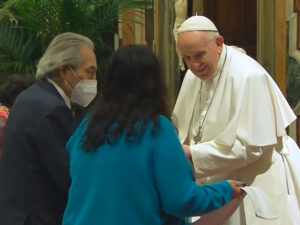Pope’s long-awaited, historic apology for Catholic Church’s role in Indian Residential Schools important first step

The 24-hour Indian Residential Schools Crisis Line is available for anyone experiencing pain or distress as a result of their residential school experience or by the information in this report – 1.800.721.0066 / 1.866.925.4419
During the final, public audience with those who were part of a weeklong delegation to the Vatican, Pope Francis spoke of feeling “sorrow and shame” for the conduct of Catholic Church members who ran the residential schools in Canada and apologized for their “deplorable conduct”. Reading from a prepared statement, the Pope said, “I ask for God’s forgiveness and I want to say to you with all my heart, I am very sorry.”
Reaction to the apology has been mixed. Some describe it as meaningless, or no apology at all, while others see it as a necessary first step to healing and reconciliation.
Members of the Indigenous delegation to Rome emphasized the importance of bringing the apology to Turtle Island, where the residential schools were located, and of the need for a clear plan of action for dealing with the ongoing legacy. The Pope’s planned visit to Canada in July, around the church’s Feast of St. Anne on July 26, is seen as an opportunity to bring the apology directly to Indigenous people and communities.
Organized by the Canadian Catholic Bishops, Assembly of First Nations, Métis National Council, and Inuit Tapiriit Kanatami, the delegation to Rome was originally planned for December 2021 but re-scheduled to the week of March 28 with a final audience on April 1. The visit involved separate meetings with First Nations, Inuit, and Métis delegates who shared personal stories about the impact and ongoing legacy of church-run residential schools. In these meetings delegates called for the release of residential school records, the repudiation of concepts used to justify European sovereignty over Indigenous lands, the repatriation of Indigenous artifacts, and a papal visit to Canada.
The First Nations delegation included former Assembly of First Nations (AFN) National Chief, Phil Fontaine, who was one of the first Indigenous leaders to speak publicly about the physical and psychological abuse at residential schools.
While with the AFN, Fontaine negotiated the Indian Residential Schools Settlement Agreement. It included a financial contribution of more than $5 billion to survivors and programs for survivors, and the Truth and Reconciliation Commission of Canada (TRC), which from 2008 to 2015 interviewed thousands of residential school survivors as part of researching the Indian Residential School system, which it described in its final report as “cultural genocide.”
In 2009, Fontaine was part of an AFN delegation to Rome that met with Pope Benedict XVI. While Benedict did express sorrow for how Indigenous children were treated at the schools, he did not issue an apology.
Speaking to the media on April 1 after the meeting with Pope Francis, Fontaine said he wasn’t expecting an apology this time either.
“I didn’t think he would say ‘I am sorry’. I didn’t think I would hear him say how he felt shame and guilt for what the church did to our people. And that he was prepared to come to Canada to meet with our people and visit our communities, and speak directly to Indigenous people, especially those that were hurt by the experience. So, it’s a pretty big day.”
Dene Nation national chief Gerald Antoine led the delegation. A residential school survivor, Antoine spoke about the importance of Indigenous peoples being involved in planning the Pope’s upcoming visit to Canada. “It would be a disappointment…to not be included in the decision-making table to this visit. We accept this apology as a gesture of good faith that acknowledges that he will come to our home, Turtle Island, and to formally apologize to all our families.”
Inuit Tapiriit Kanatami president Natan Obed said Indigenous people have been waiting decades to hear these words from the Pope and that they are important for realizing justice. “I couldn’t help but think that people can change the world, and how individuals can see that there is justice and that there is a path towards justice. It made me think of all the other people who can act with us in paths for justice associated with reconciliation and also the justice for sexual abuse and violence against children, that still have not come to justice in this country.”
Métis National Council President Cassidy Caron listened to the apology alongside 85-year-old Elder Angie Crerar, who was forced to attend the St. Joseph Residential Institution in Fort Resolution in the Northwest Territories for 10 years. Caron said Elder Crerar broke into tears at the words ‘I am sorry.’
“It was so moving because I know how important that is to her,” Caron said. “And I know how important those words are going to be to our survivors, back at home. Which is why we will continue to advocate for Pope Francis to share those words, those sentiments, what he’s learned and what he’s heard from us back on our homelands.”
TRC Call to Action 58 called on the Pope “to issue an apology to Survivors, their families, and communities for the Roman Catholic Church’s role in the spiritual, cultural, emotional, physical, and sexual abuse of First Nations, Inuit, and Métis children in Catholic-run residential schools. We call for that apology to be similar to the 2010 apology issued to Irish victims of abuse and to occur within one year of the issuing of the Report and to be delivered by the Pope in Canada.”
The Catholic Church ran approximately 70 percent of Canada’s government-funded residential schools between the 1870s and 1997. It’s estimated more than 150,000 First Nation, Inuit, and Métis children were forced to attend the schools.
The Anglican, Presbyterian and United Churches have apologized for their roles in Canada’s residential school system.
Ed Bianchi is Manager for Ecumenical and Network Development at KAIROS.
